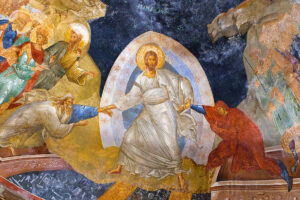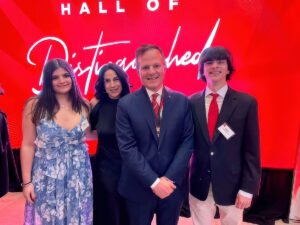The following homily was delivered by His All-Holiness Ecumenical Patriarch Bartholomew during the Divine Liturgy in the Patriarchal Church of St. George on the occasion of the 25th Anniversary since His Election, October 22, 2016.
Venerable choir of hierarchs,
Distinguished and dear officials,
Pious clergy, honorable archons, and esteemed professors,
Beloved faithful of the Mother Church,
Welcome all to this Center of Orthodoxy and our Civilization; and thank-you for coming to convey your congratulatory wishes and concelebrate this historical anniversary for us personally and for our Church, which rarely enjoys such length of tenure in its patriarchal history.
My soul magnifies the Lord and my spirit rejoices in God my Savior; for He has regarded the low estate of His servant (cf. Luke 1.46-47), whom He called to guide the spiritual vessel of the Great Church at this crucial moment in history, deeming him worthy today of completing a quarter of a century on the Throne of the First-Called Apostle Andrew and his successor Stachys, as well as numerous Saints and Peers of the Apostles that served as First-Hierarchs of this Church.
First of all, we wholeheartedly thank our brother Hierarchs, who honored us with their honorable vote — both those among us and those that have left this world, for whose eternal and indelible memory we beseech Him that has authority over life and death to grant rest in His embrace.
Moreover, we also fervently thank the rest of our holy brother Hierarchs — the younger ones, those serving in this Sacred Center and elsewhere throughout the world — for it is on account of their fraternal support and invaluable contribution that we have achieved anything positive and favorable for the Church and our People, enabling us all together to realize much of — and even beyond — what we pledged during our enthronement address in 1991.
Permit us to recount some of these briefly — surely not so much in order to satisfy any vain disposition, but for the sake of historical record and together to offer glory to Him, who is the giver of all good things in the journey of our Church over the last twenty-five years.
We have instituted the Synaxeis of Primates of our sister Orthodox Churches, where we have discussed and proposed vital issues of common interest, especially the preparation of the Holy and Great Council, which was long planned and — ultimately, with the grace of God — realized in Crete, despite the theologically and ecclesiologically inexplicable withdrawal of some Churches, to whom we simply pose the question: “Why did you hesitate?” (Cf. Matt. 14.31)
We congratulate once again and express our Patriarchal favor to the President and members of the Holy Eparchial Synod — and through them to the fine clergy, monasteries, and faithful — of the Church in Crete for their precious contribution to the success of this historic undertaking. Crete proved that it was worthy of such a great honor. We are deeply grateful to you, brother Cretan Hierarchs, for honoring us with your decision to attend all together this joyful occasion today.
We instituted the Synaxeis of the venerable Hierarchy of the Throne, which culminated in 2015 with the added participation of our brother Hierarchs of the “New Lands.”
We continued the journey of love, peace, and unity initiated by the late Patriarch Demetrios to our sister Orthodox Churches and other Christian Churches, as well as to inter-church organizations. This exchange of visitations and commission of delegations, mutual engagements and declarations, as well as personal communication through dialogue, always function as a definitive factor of reconciliation and understanding.
We organized and still continue pilgrimages and services at many sacred sites of our faith and our people throughout Asia Minor and Eastern Thrace, with the gracious permission and facilitation of the appropriate local and civil authorities. These were arranged not only personally but also by other brother Hierarchs, who obligingly fulfilled their mission as active shepherds of the blessed eparchies, to which they were elected; among the first of these, we mention our brother Metropolitan of Pisidia. We congratulate and commend them all. As the Metropolitan of Perge would say, “we chant the song of our People” at these pilgrimage sites, which once again render “our places, monuments, and history” fragrant.
We secured citizenship in this country for a good number of Hierarchs of the Throne, the members of the Patriarchal Court, and other clergy serving here, which facilitates the work of our Ecumenical Patriarchate as an institution today and in the future, while enhancing the human resources of our offices with capable staff.
We expanded and enriched the Holy and Sacred Synod, this supreme instrument of administration in our Church as the First Throne, thereby affording the opportunity to all active Metropolitans and Archbishops of the Throne to participate and contribute to its life, as well as according them rights and duties in accordance with our ecclesiology and Canon Law. Thus, the irreplaceable value of conciliarity as the nucleus of church life was underlined and highlighted.
We restored many churches and charitable institutions of this City, whose deterioration over time was gravely apparent. We therefore express our gratitude to the generous benefactors, without whose goodness and kindness it would have been difficult to achieve this sacred and pressing task. We have recently been labeled a “restorer.” However, in reality, it is divine grace that renews the Church of Christ’s Poor like the eagle, forever rendering her “the sacred vigor of Orthodox people everywhere.”
We have convened Greater, Higher, and Expanded Councils here as well as in Sofia and Geneva, whether to assist or support other sister Autocephalous Churches, at their request, to defend either the canonical order or the privileges of this Throne, whenever these were violated. For, as Emperor Alexios once wrote to Patriarch Nicholas Grammatikos, who was worthy of guiding our common and illustrious Mother Church of all in this superlative City for twenty-seven years: “Even if I may be considered the most imprudent of all people, do not ever imagine that I would be unwise about matters pertaining to the Church.”
We were deemed worthy of consecrating the Holy Chrism on three occasions during our patriarchal ministry, something that we regard as a special blessing of the Holy Spirit inasmuch as this is quite infrequent and uncommon for the brief life and tenure of any patriarch.
We have strengthened the bonds of our Sacred Center with its Eparchies throughout the world through personal visits and otherwise, but particularly through participation of their Hierarchs, as we mentioned earlier, as co-administrators in the work of the Holy and Sacred Synod of the Ecumenical Throne.
Indeed, since we are referring to our Eparchies, permit us to make special mention of our beloved birthplace Imvros where, with God’s grace, we once again enjoy Greek-language education after half a century of imposed silence on minority schools.
We have cultivated friendly relations with institutions and individuals in the Turkish community, thereby proving that the Ecumenical Patriarchate is not a foreign establishment, somehow mysterious or destabilizing for the country where its center lies; but, on the contrary, it is a symbol of reconciliation, a religious and cultural factor that promotes this country internationally, contributing to the prevalence of universal human values and ideals. More concretely, for Istanbul-Constantinople, the Ecumenical Patriarchate incarnates and expresses its eternal identity and importance. As we observed during our enthronement address and reiterated only weeks ago in Smyrna, the Ecumenical Patriarchate rejects any involvement in politics, distancing itself from “the vaporous conceit of secular authority.”
We have continued and advanced the Theological Dialogues with other Churches and Confessions, and even regard it as very positive for the Ecumenical Patriarchate that, through its initiative, we have been able to resume the most important of these dialogues, between the Orthodox and Roman Catholic Churches, after an interruption of five years. Furthermore, we express our satisfaction that the Holy and Great Council decided to maintain these bilateral Dialogues of the Orthodox Church since anything to the contrary would imply recession and introversion in the difficult and disturbing times that we live. It is not dialogue that constitutes a threat to our identity, but rather the rejection of dialogue and sterile self-confinement. In this spirit, we have also promoted interfaith dialogue with Judaism and Islam, which bear tangible results for reconciliation and the sacred cause of peace.
We have established strong ties of mutual appreciation and cooperation between the Ecumenical Patriarchate and international Organizations, such as the European Union, the European Parliament, the Council of Europe, UNESCO and others, where we have addressed the voice of the Orthodox Church as its first bishop.
We have organized numerous ecological Seminars and Summits as well as related international and interfaith Symposia, where we have advocated the sensitivity and concern of the Mother Church for the protection of the natural environment, while at the same time advancing and cultivating an ecological awareness throughout the world, emphasizing that the roots of the ecological crisis are spiritual and ethical.
We have struggled for a civilization of justice and solidarity before the cold-hearted phenomenon of globalization and the ongoing global financial crisis with its destructive consequences for a large segment of the planet’s inhabitants, while those who acquire and possess mindlessly continue to build larger barns.” (Cf. Luke 12.18)
Finally, we fulfilled our promise to be attentive to the youth. Thus, we organized two large Youth Conferences here for the youth of the Ecumenical Patriarchate (in 2000 and 2007), as well as for their responsible leaders among the Eparchies of the Throne, in order to provide them with the necessary direction. Our City hosted large youth delegations, which attended these conferences, just as we continue every two years to welcome young men and women from Finland — and send our own youth to Finland — for mutual acquaintance and fellowship.
This is what the right hand of the Highest has summarily engendered from this spiritual bastion during our patriarchal tenure. And it has achieved all this through all of us and not merely through one of us. The one is the product of the concern of the many, “just as a sacred vessel successfully navigates stormy weather and rocky seas on a daily basis.” The one expresses the concern of the many for the Church, for which the faithfulness of all, dear brother colleagues and bishops, led the late Metropolitan Nektarios of Petra to say that “the endurance and devotion of the Phanariote Hierarchs toward the Mother Church compose one of the most beautiful chapters in its history.” All of us — those Hierarchs of the Throne who live here and those who live throughout the world — have together struggled to protect the rights of the Throne, defined and defended “by ecumenical and synodal decrees,” in order to serve from our respective positions of obligation and responsibility the Pan-Orthodox unity and cooperation, thereby revealing the Phanar as a spiritual source and endless spring.
Indeed, this Church will also continue its God-pleasing ministry in the future because its duty and divinely-mandated mission is to preach the life and resurrection of the world, which is none other than Christ, “our hope” (cf. 1 Titus 1.1), “the alpha and omega, the first and last, the beginning and end.” (Rev. 22.13) In its Christ-centered and Christ-like witness, the Ecumenical Throne “on the one hand unites and supports the other Thrones, and on the other hand proves to be the glory and pride of all Christians,” to remember the words of Patriarch Nektarios of Jerusalem.
As all of you are aware, the fulfillment of our common mission is not always unchallenging or unimpeded. It demands of us all a total dedication to the labor of service and self-sacrifice, but above all it requires divine grace, which heals whatever is infirm and fills whatever is incomplete.
We have been blessed by the all-merciful God to serve the Holy and Great Church of Christ, to be heirs and trustees of its most sacred traditions, which we are obliged “without in the least swerving from our obligation” to hand down in all their integrity to future generations. Our power is spiritual; it is the imperishable strength of our Orthodox faith. To adopt the words of a faithful son of the Church: “Nurtured by its centuries-old tradition, the Phanar . . . endures within walls that are not made by human hands — walls raised by the apostle-emperor and sponsor, successive emperors, a cloud of witnesses, and countless departed. It endures and creates; it survives and thrives; it consoles and guides the whole world; it provides depth and meaning to its history. It is assailed by its foolish children; yet it forgives and loves, entering everywhere that a door of communion opens. It radiates like a spiritual sun and attracts the respect of all churches and religions. When human resources are exhausted, then divine miracles unfold.” (Constantine Vlachos) We offer glory to the good and sovereign Trinitarian God for the “great miracle” of the Great Church of Christ in this great City of Constantine.
Beloved brothers and dear children in the Lord,
We express our gratitude for your gracious presence here and invoke God’s blessing through your prayers for illumination and support so that we may successfully continue and fruitfully sustain our service as First-Hierarch within “the ever-burning, though never-consumed bush” of our patriarchal mission. Your benevolence renders this fire refreshing and renewing.
We are especially thankful to the holy Hierarchs for concelebrating with the abbot of this great Monastery. As Dositheos Kanellos, that lover of Constantinople, writes: “Such a concelebration manifests an unsurpassed grandeur, recalling — even if partly — the former Monasteries of this City, such as that of Studion, of the Pantokrator, of Chora, and so many others.” Your fervent and fraternal love, venerable Hierarchs and Bishops, reminds us of the words of St. Ignatius to the Smyrnaeans: “Even if I am incapable, nevertheless your eagerness is great.” (IX, 38)
This is all that we have to say, dear brothers and beloved children. “Now to Him who by the power at work within us is able to do far more abundantly than all that we ask or think, to Him be glory in the Church and in Christ Jesus to all generations, for ever and ever. Amen.” (Eph. 3.20-21)
Glory be to God for all things!






